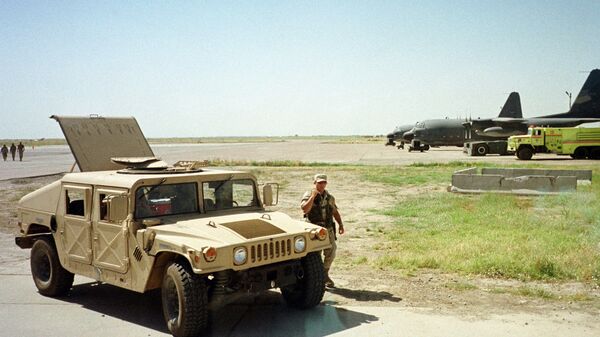The House Subcommittee on National Security has ruled to de-classify a significant array of documents from the Department of Defence that suggest that American troops, stationed at Camp Stronghold Freedom at the Karshi-Khanabad (K2) Air Base in Uzbekistan between 2001 and 2005, were constantly exposed to several types of hazardous toxins and even radiation, and have since been suffering health issues likely connected to the conditions at the base.
Democratic chairman of the subcommittee Stephen Lynch and his fellow committee members have indicated that the poisonous conditions at the K2 base could have resulted in numerous medical issues for some of the 10,100 veterans who fought in the Afghanistan war and were stationed at Camp Stronghold Freedom. The lawmakers noted that so far these soldiers, who have showed "cancer rates five times higher than" their fellow servicemen, were denied the disability and health-care benefits they deserved and called on the rest of Congress to act in order to fix the situation.
"It is deeply troubling that despite clear evidence they were exposed to toxic and radioactive materials, these courageous veterans and their families are being denied treatment and benefits for their service-connected disabilities, which include cancer and other devastating health conditions," chairman Lynch stated.
Republican member of the subcommittee Mark Green, in turn, noted that there has been "a mounting body of evidence" that the K2 servicemen were exposed to "highly toxic chemicals and radioactive materials", and that the matter had been known to the DoD, according to a number of now-declassified reports from 2001, 2002 and 2004. The lawmakers noted that the efforts to declassify the reports were taken in order to "gain justice" for the veterans, and to help them in making "informed healthcare decisions" based on the actual information about the hazards they had been exposed to.
"Americans who served at K2 put their lives on the line to protect our country, and for years their government has denied them answers. The Oversight Committee will continue to seek justice on behalf of our K2 heroes and work to ensure that our service members and veterans are appropriately compensated for their sacrifice," Carolyn Maloney, Chairwoman of the House Oversight Committee which includes the Subcommittee on National Security, stated.
Serving on Contaminated Soil
The released reports show that the American troops at the K2 base were almost constantly exposed to the vapours of petrochemical products, such as jet fuel, and volatile organic compounds, which could pose "adverse health effects to personnel". The toxins were found at numerous locations throughout the base, including in the tent city where soldiers lived, and seemingly contaminated the soil.
The majority of the US servicemen were also exposed to the vapours of tetrachloroethylene – a chemical that is mostly used in cleaning compounds and is suspected to increase the risks of "bladder cancer, multiple myeloma, or non-Hodgkin’s lymphoma".
The K2 soldiers were also "frequently" exposed to Particulate Matter 10 (PM10), which was deemed one of the "greatest [health] problems" among the troops, due to its ability to settle in deep in lungs and even penetrate into the bloodstream.
Camp Stronghold Freedom was also located in the direct vicinity of a former missile site called "Site 1" that was found to contain "small pieces of depleted uranium" back in 2001. And while the US base was deemed to be at a safe distance from it, the DoD reports suggested that while most soldiers only came in daily contact with background radiation levels, less than 10% of them encountered levels "four times above background".
Base Officials Purportedly Toned Down Health Concerns
The committee members indicated that the release of previously classified reports is just the beginning of their work, promising to conduct a "full investigation" of the K2 troops' exposure and why was it allowed despite the existing concerns regarding environmental hazards.
According to the testimonies of US Air Force Master Sergeant Paul Widener, the soldiers serving at the base were "repeatedly" informed about the hazards, but were told that they pose "no significant risk" to them. He added that the base command held no "briefings on toxic exposure" and didn't recommend wearing, let alone provide, protective equipment for the soldiers.
The Department of Defence has not commented on the release of the documents by the committee so far.






